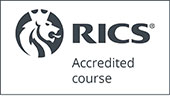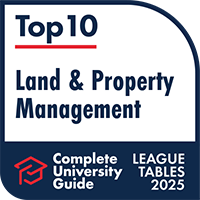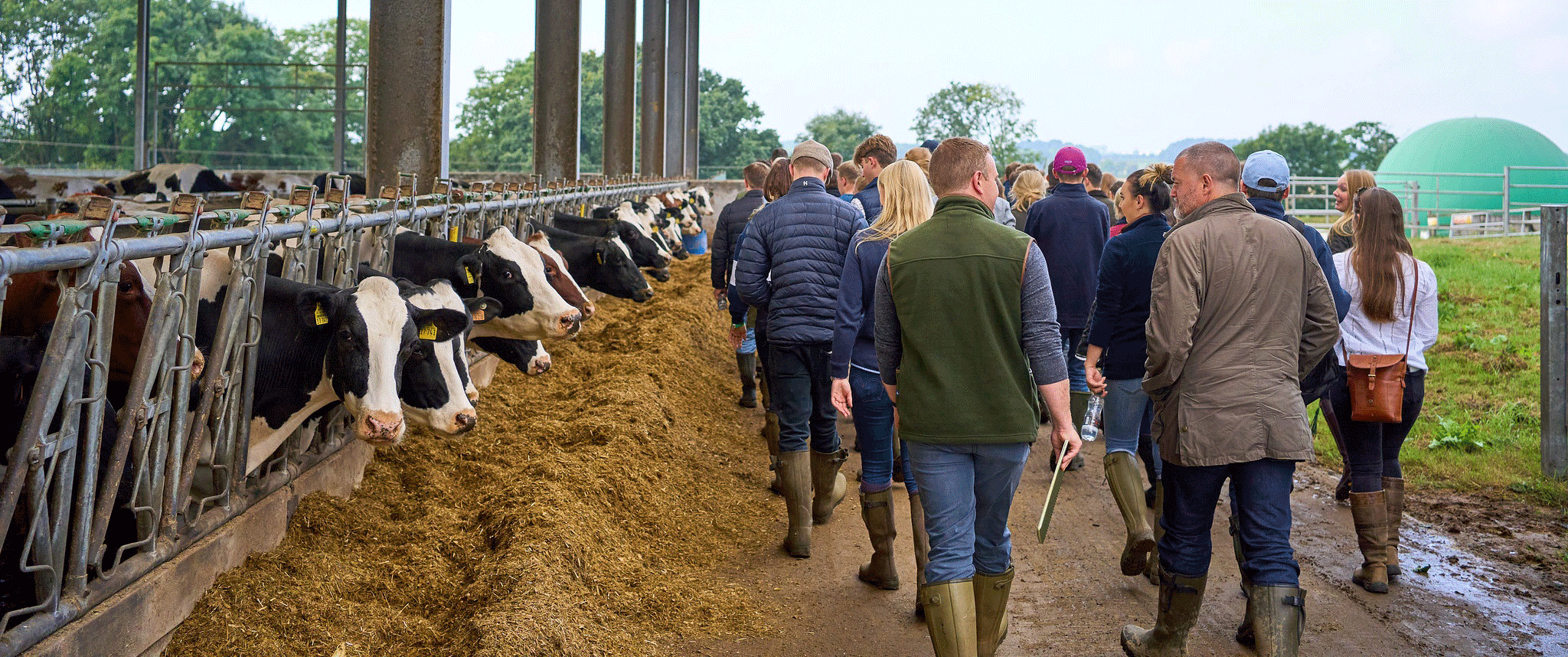BSc (Hons) Rural Land and Property Management
This course offers proven routes to rewarding careers within rural business, estate management, consultancy and property in the countryside. Strutt and Parker, Dalcour Maclaren, Savills and Fisher German are some of the nationally recognised businesses our graduates have gone on to work for – and so could you.
Course overview
Accredited by the Royal Institution of Chartered Surveyors (RICS), you will learn the fundamentals of rural professional practice as well as planning and development, law, valuation, building construction and management. You will develop an essential understanding of sustainability and wider business management to enable you to provide effective advice about farm, estate and other rural businesses while gaining an overall understanding of the multi-functionality of rural practice.
"95% in work or doing further study 15 months after the course"
Graduate Outcomes Survey 2025
This degree is the ideal launch pad into the world of rural land management, or other sectors, depending on your career aspirations. You can gain some additional real-world experience and carve your first steps into your future career through the work placement.
Typically, graduates enter employment in rural practice surveying to undertake the two-year Assessment of Professional Competence (APC) and qualify as Chartered Surveyors.
Many graduates also seek qualification as Fellows of the Central Association of Agricultural Valuers (CAAV) at the same time as completing the APC. During your time here, you can enjoy the benefits of a student membership of both RICS and CAAV.

If you are interested in finding out more about the Royal Institution of Chartered Surveyors (RICS), they have produced this short video highlighting their work.
Work placement
You will complete a period of work experience as an assessed part of your course. Our Careers Team run a careers fair each year, providing you with an opportunity to meet with potential employers. There is also an option of a full placement year.
Many of our students are also recognised as the future of the industry. Hear from Grace Gardiner, finalist in the South West Women in Property Student Awards 2020, talking about sustainability in land management.

Course content
Modules are assessed through a range of coursework, often based on real-life case studies and sponsored by land management firms, which help you to see the practical application of the subjects you are studying. In your third year, case studies are supplied by practising surveyors from their own portfolios of work.
You will complete a research project in a subject area of specific interest. The course is also flexible and it is possible to transfer on to the Real Estate degree if certain conditions are met.
A part-time learning route to study is available.
Timetables
Please note that while we make every effort to ensure that timetables are as student-friendly as possible, scheduled teaching can take place on any day of the week. Wednesday afternoons are normally reserved for sports and societies activities.
Modules
Each module is worth a specified number of credits. Each credit equates to 10 hours of total study time. Total study time includes scheduled teaching, independent study and assessment activity.
Full time students normally take modules worth 60 credits per 15 week semester but this can vary depend on your elective choice. Part time students taking proportionally fewer credits per semester. All students take a total of 120 credits per level and 360 credits for the degree as a whole. Your overall grade for your degree is based on marks obtained for modules taken at level 5 and level 6 (weighted 30:70 accordingly.)
The modules available for this degree are shown below. They may change for your year of study as we regularly review our module offerings to ensure they’re informed by the latest research and teaching methods.
Year one
In the first year, you will develop an understanding of agriculture and rural land use. You will be introduced to core property studies in law, valuation and building construction, and gain an understanding of economics, accounting and finance.
- 4L001 Building Technology and Regulation: This module introduces students to the fundamental principles of building science, construction methods, and building regulations in England and Wales. It explores the evolution of traditional and modern construction technologies, with a focus on sustainability, accessibility, and regulatory compliance. Students examine structural principles, building materials, and services across domestic, commercial, and rural contexts. Assessment includes a multiple-choice online test, a 1500-word technical portfolio, and a 2000-word problem sheet. The module supports critical understanding of construction efficiency, sustainable practices, and regulatory frameworks.
- 4L002 Foundations of Law: This module provides a comprehensive introduction to the English legal system, essential for future study in Land Law. It covers sources of law, contract and tort law, legal research, and dispute resolution. Students develop skills in legal analysis and professional communication relevant to property management. Assessment includes a multiple-choice online test, a 1500-word essay, and a 2000-word professional practice report. The module supports legal literacy, critical thinking, and professional advisory skills.
- 4L003 Property Valuation and Appraisal: This module introduces students to the principles and methods of property valuation and appraisal, including investment analysis and sustainability considerations. It covers valuation techniques, professional standards (RICS), and the use of valuation tables and measurement codes. Students apply theoretical knowledge to real-world scenarios across various property types. Assessment includes a 1500-word problem sheet and a two-hour written exam. The module supports technical competence, professional communication, and sustainable thinking in valuation practice.
- 4B001 Practical Business, Finance and Accounts: This module introduces students to financial principles in agri-business and rural enterprise contexts. It covers financial statements, budgeting, investment appraisal, and decision-making tools. Students develop analytical and communication skills essential for interpreting financial data and planning business strategies. Assessment includes a 2000-word problem sheet and a 2000-word professional practice report. The module supports financial literacy, business planning, and critical evaluation of enterprise performance.
- 4A006 Agriculture for Land Managers: This module introduces students to UK farm enterprises including livestock, crops, and grasses. It covers enterprise outputs, husbandry, gross margins, and machinery management. Students engage in seminars, lab and fieldwork, and farm visits. Assessment includes a group presentation (25%), a laboratory report (25%), and an online multiple-choice test (50%). The module supports understanding of farm systems, anatomy and physiology of livestock, and crop growth stages, with emphasis on sustainability, innovation, and technical skills.
- 4M002 Professional, Practical and Study Skills: This module develops academic, employability, and practical skills for success in university and land-based careers. It includes reflective writing, data handling, digital literacy, and hands-on tasks relevant to the sector. Students explore sustainability, industry challenges, and professional development. Assessment includes a skills portfolio, a 1000-word reflective account, and a group presentation on a sustainability challenge. The module supports self-awareness, technical competence, and a sustainable mindset.
Year two
- 5L001 Land and Property Law: This module deepens students’ understanding of land and property law, focusing on legal estates, interests, and landlord-tenant relationships. Topics include conveyancing, easements, covenants, co-ownership, and tenancy law. Students apply legal principles to real-world property management scenarios. Assessment includes an 1800-word professional practice report, a multiple-choice online test, and an 1800-word problem sheet. The module supports the development of legal reasoning, client advisory skills, and professional communication.
- 5L002 Valuation Appraisal and Building Pathology: This module integrates valuation techniques with building pathology, enabling students to assess property value in relation to building condition, obsolescence, and market trends. Students explore valuation methods, building defects, and the impact of legislation on property values. Assessment includes two 2000-word professional practice reports, one of which is a Red Book valuation. The module supports technical competence in surveying, critical analysis, and professional reporting.
- 5L003 Property Finance, Business and Taxation: This module introduces students to property finance structures, taxation, and business planning in rural and urban contexts. Topics include development finance, capital appraisal, national and local taxation, and the reuse of farm buildings. Assessment includes two 1500-word professional practice reports and a 5-minute group presentation. The module supports financial literacy, strategic thinking, and understanding of taxation impacts on property decisions.
- 5L004 Planning and Development: This module explores the planning and development process in rural and urban contexts, focusing on policy, law, sustainability, and site assessment. Students examine the National Planning Policy Framework, land measurement, planning applications, and emerging technologies. Assessment includes a 1600-word skills portfolio with artefacts and a 2400-word professional practice report. The module supports critical understanding of planning systems, technical competence, and client advisory skills.
- 5L006 Management of the Natural and Built Environments: This module explores sustainability and environmental management across rural and built landscapes. Topics include forestry, biodiversity, environmental law, building maintenance, and land use diversification. Students develop practical skills through site visits and case studies. Assessment includes a 2000-word group case study report (50%) and a professional practice report (50%) advising on building condition, maintenance, and repurposing strategies. The module supports critical understanding of ecosystem services, resource management, and sustainable development in land and property contexts.
- 5M002 Research and Evidence: This module develops students’ ability to design and justify research proposals using both quantitative and qualitative methods. Topics include study design, data analysis, ethics, and communication of findings. Students engage with real-world problems and explore research applications across disciplines. Assessment includes a 2500-word research proposal and a 2-hour online test. The module supports evidence-based thinking, analytical skills, and preparation for the Level 6 dissertation.
- 5M001 Industry Engagement: This module provides students with a structured industry placement to develop professional, technical, and reflective skills in a real-world context. Students complete a minimum of 444 hours of work-based learning aligned to their career goals. Assessment includes a CV and personal statement (500 words) and a reflective portfolio (1000 words). The module supports employability, self-awareness, and the application of academic knowledge in professional settings.
Year three
In the third year, you will complete a research dissertation on a subject of your choosing, and select two elective modules to suit your specialist areas of interest.
- 6L005 Rural Land & Business Management: This module explores agricultural tenancy law and rural estate business strategy. Students examine the Agricultural Holdings Act 1986 and Agricultural Tenancies Act 1995, alongside alternative land structures. The second part focuses on estate planning, taxation, succession, and diversification. Assessment includes a 1200-word problem sheet (30%), a 2-hour written exam (30%), and a 1600-word professional practice report (40%). The module supports legal understanding, valuation skills, and strategic planning for rural land and business management.
- 6L002 Utilities and Infrastructure: This module examines statutory valuation, compulsory purchase, and infrastructure development across sectors such as transport, energy, and digital networks. Students explore valuation methods, legal frameworks, and compensation assessment. Topics include leasehold reform, planning compensation, and dispute resolution. Assessment includes a 1000-word audio-visual presentation, a 2800-word professional practice report, and an online test. The module supports applied valuation skills, legal understanding, and professional advisory competence.
- 6M001 Research Project: This module enables students to undertake an independent research project aligned with their subject area. Students develop a research question, design a methodology, and collect and analyse data. Support is provided through supervision and workshops. Assessment includes a 5-minute presentation and a 12,000-word thesis or equivalent multimedia portfolio. The module supports critical thinking, research skills, and evidence-based recommendations.
Plus a choice of TWO electives selected from a broad range, including:
- 6L003 Forestry and Natural Resources: This module examines woodland and natural resource management in rural and urban contexts. Students explore tree identification, silviculture, ecosystem services, and natural capital. Emphasis is placed on sustainability, biodiversity, and balancing timber production with environmental benefits. Assessment includes a 2400-word woodland management plan and a 1600-word portfolio of artefacts. The module supports applied ecological knowledge, critical thinking, and sustainable land use planning.
- 6L004 Advanced Residential Agency: This module explores the sale and marketing of residential property, including legal frameworks, valuation, and agency operations. Students examine statutory compliance, marketing strategies, and the use of digital tools such as CRMs and property portals. Topics include vernacular architecture, new homes, and sustainability in housing. Assessment includes a 5-minute individual presentation and a 3200-word professional practice report. The module supports technical competence, communication, and innovation in residential agency.
- 6L001 Commercial Property Management: This module explores the principles and practices of managing commercial property in rural and urban contexts. Topics include lease management, service charges, tenant selection, repairs, planning, and professional ethics. Students examine how property management aligns with client investment objectives. Assessment includes two 2000-word professional practice reports. The module supports technical competence, strategic thinking, and preparation for RICS membership.
The availability of electives to individual students will be dependent on timetabling considerations and on sufficient students electing to take part.
Disclaimer information
The University has established various rules and regulations that you must agree to and follow if you accept an offer to study with us. View our full disclaimer notice.
Careers and graduate destinations
- Land and property consultancy
- Valuation
- Estate management
- Residential sales and lettings
- Entrepreneurs/business managers
- Auctioneers
- Utilities and compulsory purchase
- Town and country planning
In the last two years, the main property employers of Rural Land Management graduates have been:
"One of the things I most enjoyed about the course was the variety of learning I was able to undertake. From aspects of commercial and residential valuations and law to agricultural law and forestry management, the course provided me with a really comprehensive overview of land and property management"
Cameron Gleed, Graduate
Entry requirements
Typical offers
Required: GCSE minimum five GCSEs at Grade C/4 including English Language and Mathematics (or Maths Numeracy for Welsh applicants) plus satisfactory level 3 qualifications:
- A-Level: (Example grades BCC) – minimum of 104 UCAS tariff points across three A-Levels or equivalent qualifications
- C&G Advanced Technical/BTEC - Level 3 Extended Diploma (1080) at Distinction-Merit-Merit
- C&G NPTC/C&G Advanced Technical/BTEC - Level 3 Diploma (720), Extended Certificate (360) and 90-Credit Diploma (540) acceptable when accompanied by other Level 3 qualifications
- International Baccalaureate: 26 points
- Access to Higher Education: 45 credits at level 3, of which 21 must be awarded at Distinction and 15 at Merit or higher. (Pass at Functional Skills level 2 are accepted in lieu of GCSE English & Mathematics)
- A period of relevant practical experience is also highly recommended
Other level 3 qualifications will be considered.
Visit the UCAS website to calculate your UCAS Tariff points from the qualifications and grades achieved.
You may also be eligible for a contextual offer if you’re from one of our link colleges, have been in care, from a non-white ethnic background, live in an area with low progression rates to university or you are a veteran/child of an armed forces family.
Flexible entry
The University welcomes interest from applicants who may not have the standard entry requirements. A wide range of qualifications and experience are accepted in order to join University degree programmes. The University always considers evidence of personal, professional (APL) and educational experience, (APEL), which show an ability to meet the demands of their intended programme of study.
Further information
Alternative entry routes are available for a range of other qualifications. Prior experience is also considered, subject to approval by the programme manager and admissions staff.
Read more general information about our entry requirements.
If you don't meet the entry requirements of this course, you may be eligible for one of our Foundation degree courses or another related degree course.
International students will also need to achieve IELTS Academic or equivalent at the appropriate level for your programme of study. English language requirements for international students.
For any further help, please contact our admissions team:
- Email: admissions@rau.ac.uk
- Telephone: +44 (0)1285 889912
Fees
2026-27 Applicants
For the academic year 2026-27 the tuition fees for this course are:
| UK | International | |
|---|---|---|
| Full-time | £9,790 per year | £16,950 per year |
For part-time study, please contact admissions@rau.ac.uk for further information.
Please also refer to the funding your time at university page.
Tuition fees may be subject to an inflationary increase each year as set out in our Access and Participation Plan and are subject to Government and regulatory body conditions.
If you are an Irish national you can check if you meet the requirements for Home Fees. Please visit the UKCISA website and consult the pdf guide “England HE – who pays Home Fees”. First check category ‘3 years in Republic of Ireland/UK/Islands, settled in UK’ or ‘Brexit temporary offer for courses starting before 2028: Irish citizens with residence in Europe or overseas territories’. You will possibly need to be fee assessed when you submit an application for study to the RAU.
Scholarships
The University offers a wide range of generous fee waivers and bursaries. To find out more about the these, please visit the bursaries, awards and scholarships page.
Ready to take the plunge? Apply now
Applications should be made by the UCAS deadline to ensure we are able to offer you a place on your first choice course. However, if you have missed the deadline please contact Admissions@rau.ac.uk as there are usually places available.
If you would like to apply during UCAS Extra or Clearing, please check that we have places available.
Applicants wishing to study on a course on a part-time basis will need to apply directly to the RAU.
Please contact admissions@rau.ac.uk to discuss your requirements and obtain an application form.






